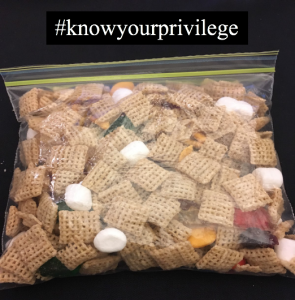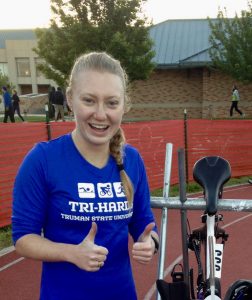#Adulting can be hard. I am 24 and I feel like I’ve barely scraped the surface of the #learningtoadult phase. Though I highly doubt it’s a phase. #Adulting involves adapting to new situations and meeting new people, and that happens throughout the lifespan. So in summary, even as “an adult”, we continue to grow, and one of the major areas of growth needs to be cultural competence.
What is cultural competence?
I define it as understanding another’s experience through your own eyes, and having the awareness and humility to know your privilege and to let go of your prejudices in order to respectfully and appropriately interact with those of diverse backgrounds.
To “understand another’s experience through your own eyes” means that no matter how much you read about or ask about someone’s life, for example someone of a different race, you do not understand the “lived experience”. I am White. I have lived in a very White bubble for most of my life, but through certain leadership opportunities I have been introduced to diverse experiences, including the Black experience and have learned an astronomical amount about myself and how my background impacts my perspective of Black or African American (AA) populations.
My most recent opportunity came on Martin Luther King Jr. Day, at the Indiana University Unity Summit held in the Neal-Marshall Black Culture Center. At the Summit each table participated in an activity that demonstrated privilege, not just regarding race, but the gamut of diversity: religion, gender, sexuality, socioeconomic status (SES), (dis)ability, and race. Throughout the activity, stories were voluntarily shared and I was able to learn about the personal experience of each student at my table. One young woman’s story specifically stood out.
This young woman is black and expressed her need to think about her hair style before going to the mall. This baffled me, so I asked if she would elaborate. She told me that hair in braids is considered “ghetto” and unless she wore it down and curled (essentially in a hairdo that resembles a White-person’s hair) she would be singled out or at least observed for suspicious behavior. This is one of many experiences I have heard, but I still can only imagine. If I want to #Adult, I must tackle the next layer of cultural competence, “having the awareness and humility to know [my] privilege”.
Privilege is often misunderstood. It is often defined by explicit characteristics, e.g. religion, gender, sexuality, SES, (dis)ability, and race–the same categories identified in the activity at the Unity Summit. However, privilege is not based on, for example, the specific color of one’s skin, but rather on the meaning of that color within society AND the individual’s experience with that identity. In other words, just because someone has black skin does not mean they exclusively do not have privilege. For example, Atlanta, Georgia has more Black people than White people. It is possible the young woman from my table at the Unity Summit would not feel singled out in a mall in Atlanta if she wore braids, unlike her experience in Indiana.
You may ask, how is that privilege? And I define privilege as, not having an extra layer of concern, uncertainty, or insecurity that is loosely related to one of the six categories of diversity: religion, gender, sexuality, SES, (dis)ability, and race. During the activity presented at the Unity Summit, we were to fill a bag full of treats in response to ~35 questions about our experience related to those six categories. However, the questions were not in any particular order and were inclusive in that they did not assume someone with a particular characteristic experienced the same things. I have provided some examples below:
- I have felt unsafe walking to my car alone at night.
- I know someone who has a family structure that reflects LGBTQ identities.
- My intelligence has been questioned because of the way I speak.
- My religion is rarely portrayed in the media.
- I have to think about my hair style before I go to the mall in order to avoid suspicion.
We proceeded to fill our bags with bland Rice ChexTM cereal for not agreeing and a variety of yummy snacks for agreeing. By the end of the activity, each person in the room had a bag mixed with different proportions of that bland Rice ChexTM cereal, gummy bears, dried cranberries, marshmallows, M&M’SⓇ, GoldfishⓇ, and pretzels.
This was my bag.

What might yours look like? Would you have more marshmallows than gummy bears? More M&M’SⓇ than GoldfishⓇ? It appears I had lot of Rice ChexTM cereal, but when I looked around, so did everyone else. No matter our background, we all have some amount of privilege and we all have experienced some level of inequality. #Adulting requires us to have a deeper understanding of this concept, and to recognize our own bag of Rice ChexTM cereal mixed with delicious treats, so that we can “respectfully and appropriately interact with those of diverse backgrounds.”
This leads into the most important piece of becoming culturally competent, “having the awareness and humility…to let go of your prejudices.” We all have them, prejudices. They stem from stereotypes we picked up during our lifetime. In order to let go of these false assumptions about entire groups of people, you must first #knowyourprivilege–fill your bag. As discussed, this helps to identify and accept YOUR OWN experience related to those 6 categories: religion, gender, sexuality, SES, (dis)ability, and race. Once you are confident with the makeup of your bag, think about the treats for which your bag contains few or none. For example, my bag contained no pretzels, which represented my privilege as it relates to religion. This means every time a question like example #4, “my religion is rarely portrayed in the media”, came around, I scooped Rice ChexTM cereal instead of pretzels into my bag.
Often prejudices lie within the categories for which our privilege is higher. I attribute this to social bubbles, limited integration, and the uncomfortableness to break down these boundaries. However, that is a problem much bigger than this post can address. For now, I want to give a personal anecdote of a prejudice I have struggled with, in hopes to empower you to acknowledge and challenge your own.
Sophomore year of college I was in a research group with a young black girl who spoke African American English (AAE)–a dialect of English primarily used by some African American or Black groups in the United States. As stated earlier, I lived in a White bubble, so I had never heard AAE spoken by anyone except on TV. At the time I attributed my behavior to my type-A personality, but hindsight, it was my prejudice. Throughout the semester and specifically when it was time to turn in the final paper, I double checked and regrettably edited her work. I did not come to understand the weight of my actions until two years later at The LeaderShape Institute.
The realization of my actions, was a turning point in my journey toward #Adulting. I gained an understanding of privilege, prejudice, and diversity and welcomed the opportunity to become culturally competent. Since then I continuously challenge myself to #knowmyprivelege, to identify and accept my prejudices, and to let go of those prejudices by not making assumptions about any individual or group I encounter. By doing this, I can minimize barriers that prevent me from “respectfully and appropriately interact[ing] with those of diverse backgrounds.”
Especially in a health-related career, cultural competency is essential for success on both the individual and community level. Whether you are seeing a patient for diabetes or implementing a program to increase physical activity within the high school, goals and objectives will not be met unless you can respect the diversity of the patients or populations you are working with.
So as you consider what #Adulting means to you, I encourage you to reflect on your current level of cultural competence. Do you #knowyourprivilege? What prejudices have guided your past behaviors and how can you challenge those assumptions?
If you are interested in learning about other topics included in this month’s theme, #Adulting, sign up to attend the Office of Career Services’ workshop “Adulting: Preparing for What Comes Next” taking place on February 5, 2018 from 4-6 pm in the IMU-dogwood room. Pizza provided with RSVP!
For more resources on diversity and cultural competence, visit the Office of the Vice President for Diversity, Equity, and Multicultural Affairs at Indiana University.

I TRI for Longevity, so one day WE can change the World!


